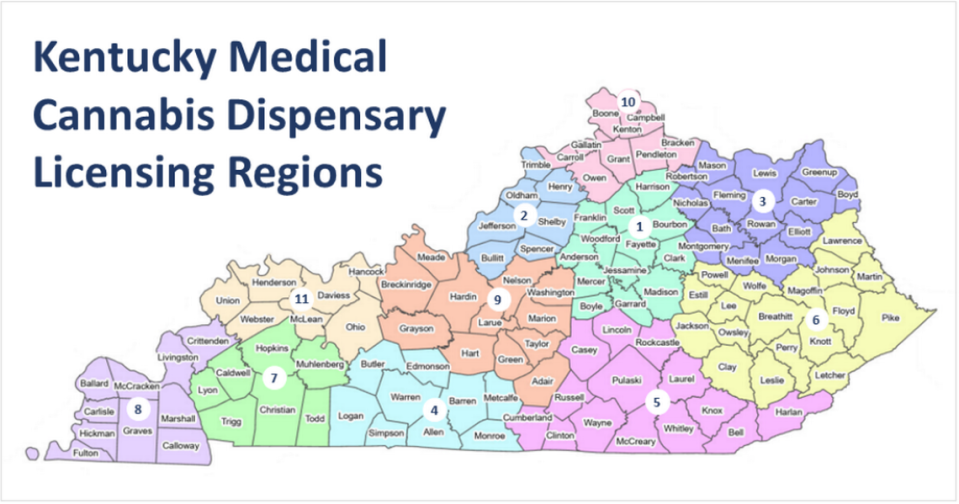Where will you be able to buy medical cannabis in 2025? See KY’s 11 dispensary regions
In our In the Spotlight stories, Herald-Leader journalists bring you continuing coverage of news and events important to our Central Kentucky community. Read more. Story idea? hlcityregion@herald-leader.com.
Medical marijuana cardholders in Kentucky will be able to use the products starting Jan. 1, 2025, and the program’s executive director says dispensaries should be a relatively short drive away for patients — no matter where they live.
To make the process fair, the Kentucky medical cannabis program is granting the initial set of licenses via a lottery, but program leaders also have an eye toward geographic barriers to access, its executive director recently said. Kentucky’s medical cannabis dispensaries will operate in 11 regions across the state.
Here’s a short description of each one, including the rules and requirements dispensaries have to follow to hold on to their state licenses.
Where can medical marijuana dispensaries open in Kentucky?
Kentucky’s medical cannabis program will initially grant 48 licenses to dispensaries.
Those dispensaries will be able to operate in 11 regions across the state, which Sam Flynn, the state program’s executive director, said is meant to give patients ease of access.
“To ensure patient access, dispensaries need to be located near Kentucky cardholders,” Flynn said at a news conference in April. “These regions were developed with the Kentucky Transportation Cabinet and the Commonwealth Office of Technology to ensure that Kentuckians with qualifying conditions like cancer and [post-traumatic stress disorder] have the shortest possible drive time to the medical cannabis dispensary nearest them.”
Flynn also said each of these regions will be allowed to issue no more than four dispensary licenses, except the regions encompassing Louisville and Lexington, which can have up to six. Additionally, no county can have more than one dispensary in the initial rollout of licenses, except Jefferson and Fayette counties, which can have up to two each, Flynn said.
The regions and the counties they encompass are as follows:
Region 1: (Bluegrass) - Anderson, Bourbon, Boyle, Clark, Fayette, Franklin, Garrard, Harrison, Jessamine, Madison, Mercer, Scott and Woodford counties.
Region 2: (Kentuckiana) - Bullitt, Henry, Jefferson, Oldham, Shelby, Spencer and Trimble counties.
Region 3: (Northeast) - Bath, Boyd, Carter, Elliott, Fleming, Greenup, Lewis, Mason, Menifee, Montgomery, Morgan, Nicholas, Robertson and Rowan counties.
Region 4: (Southcentral) - Allen, Barren, Butler, Edmonson, Logan, Metcalfe, Monroe, Simpson and Warren counties.
Region 5: (Cumberland) - Bell, Casey, Clinton, Cumberland, Harlan, Knox, Laurel, Lincoln, McCreary, Pulaski, Rockcastle, Russell, Wayne and Whitley counties.

Region 6: (Mountain) - Breathitt, Clay, Estill, Floyd, Jackson, Johnson, Knott, Lawrence, Lee, Leslie, Letcher, Magoffin, Martin, Owsley, Perry, Pike, Powell and Wolfe counties.
Region 7: Pennyrile - Caldwell, Christian, Hopkins, Lyons, Muhlenberg, Todd and Trigg counties.
Region 8: West Kentucky - Ballard, Calloway, Carlisle, Crittenden, Fulton, Graves, Hickman, Livingston, McCracken and Marshall counties.
Region 9: Lincoln Trail - Adair, Breckinridge, Grayson, Green, Hardin, Hart, Larue, Marion, Meade, Nelson, Taylor and Washington counties.
Region 10: Northern Kentucky - Boone, Bracken, Campbell, Carroll, Gallatin, Grant, Kenton, Owen and Pendleton counties.
Region 11: Green River - Daviess, Hancock, Henderson, McLean, Ohio, Union and Webster counties.
Interested businesses can apply for the license lottery beginning July 1. The application period closes Aug. 31 in preparation for the drawing in October.
How do patients become medical marijuana cardholders?
Starting Jan. 1, a registration portal will open for qualifying patients seeking to become cardholders. To qualify, individuals must meet each of the following requirements, per the state medical cannabis program’s website:
Be a resident of Kentucky
Have not been convicted of a disqualifying felony offense
Patients must have one of the qualifying medical conditions, which are:
Any type or form of cancer regardless of stage
Chronic, severe, intractable or debilitating pain
Epilepsy or any other intractable seizure disorder
Multiple sclerosis, muscle spasms or spasticity
Chronic nausea or cyclical vomiting syndrome that has proven resistant to other conventional medical treatments
Post-traumatic stress disorder
Patients must also visit an authorized medical cannabis practitioner and receive a written certification to use medical cannabis.
The written certification must come from a physician who is authorized to prescribe controlled substances, and the certification itself is only valid for 60 days after the date it was written. Given that, patients should look to obtain their certification no sooner than Nov. 1, according to the state program’s website.
What rules are dispensaries required to follow?
Requirements for dispensaries are detailed in Kentucky Administrative Regulation 1:070, and other requirements are listed on the state program’s website.
Additionally, municipalities across the state are updating local zoning laws to account for dispensaries and other types of businesses in the sector. That includes Lexington, which is in the process of revising its zoning laws. Any changes are expected to be sent to the Lexington-Fayette Urban County Council for final approval by late May.
Some general requirements for dispensaries laid out in the state regulation are as follows:
Dispensaries must be licensed by the state, which will publish a list at kymedcan.ky.gov.
Dispensaries cannot sell directly to minors.
Dispensaries are not allowed to sell medical cannabis products that are designed to be vaped to cardholders or designated caregivers younger than 21 years old.
Dispensaries cannot co-locate in a shared space or have any financial arrangement with a medicinal cannabis practitioner.
Kentucky dispensaries are limited in the types of medical cannabis products they can sell or deal in. This includes raw plant material with a delta-9 tetrahydrocannabinol (THC) content of more than 35% and edibles, oils or tinctures containing more than 10 milligrams of THC per serving. It also includes any other with a THC content of more than 70%.
Do you have questions about weed in Kentucky for our service journalism team? Send us an email at ask@herald-leader.com or submit your question with the Know Your Kentucky form below.

